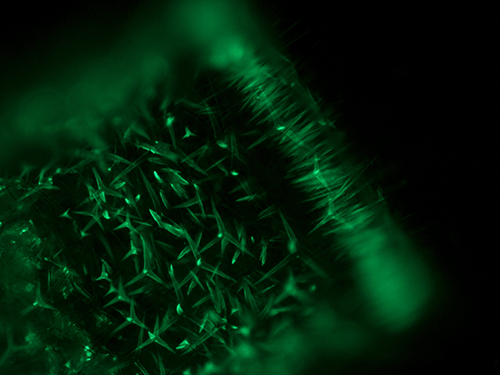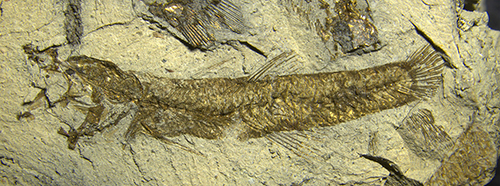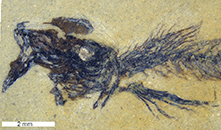Notes
-
11.04.2024
Geobiology: new placozoan habitat discovered
DNA-Spuren im Magen räuberischer Schnecken ermöglichen einem Team um den LMU-Geobiologen Gert Wörheide neue Einblicke in die Ökologie der Scheibentiere. more
-
25.07.2023
New source of information on evolution of European gobies
A team led by LMU paleontologist Bettina Reichenbacher has demonstrated for the first time that ‘earstones’ and skeletal traits permit to recognize familial relationships of the fish. more
-
27.06.2023
Glass sponge genome furnishes insights into evolution of biomineralization
The genome of a glass sponge species suggests that silica skeletons evolved independently in several groups of sponges. more
-
11.04.2023
Prof. Dr. Manuel Aranda
Manuel Aranda is a Visiting Fellow at CAS in April and May 2023 at the invitation of Prof. Dr. Gert Wörheide (Palaeontology and Geobiology). more
-
11.11.2022
Crown-of-thorns seastar from Red Sea
LMU and SNSB researchers have identified coral-eating crown-of-thorns seastars in the Red Sea as distinct species that occurs only in this location. more
-
07.11.2022
How Scientists Used Lasers, Satellites and Planes to Map One of Indonesia’s Biggest Sources of Emissions
-
04.11.2022
New executive board composition 2022
-
23.09.2022
Environmental Medal of Bavaria for Andreas Fleischmann
GeoBio Center LMU member PD Dr. Andreas Fleischmann received the Environmental Medal of Bavaria. more
-
11.07.2022
Paleobiology: complex family relationships
An international team of researchers led by LMU paleontologist Bettina Reichenbacher has managed to classify fossils of one of the most species-rich fish groups into a family tree for the first time. more
-
12.01.2022
Low CO2 concentrations
The team led by LMU researcher Sebastian Höhna reports in Nature Communications. more
-
10.01.2022
ERC Starting Grant awarded to Dr. Sebastian Höhn
Dr. Sebastian Höhna is one of four receipents at LMU of a prestigeous Starting Grant of the European Research Council (ERC). more
-
19.11.2021
Climate change: Independent stress response makes octocorals more robust
LMU scientists have identified mechanisms that make octocorals less sensitive to the effects of climate change than other kinds of coral. more
-
17.09.2021
Deep-sea biodiversity off New Zealand higher than assumed
During a research cruise off the coast of New Zealand, a team led by LMU geobiologist Gert Wörheide discovered six new species of glass sponge. more
-
17.08.2021
Microbiology: Bacterial evolution in ancient sub-seafloor sediments
Micro-organisms persisting deep below the seafloor for millions of years continue to evolve despite living at the energy limit to life. more
-
22.02.2021
Glimpses of ancient environments
Zoologists at LMU report the discovery of a trove of fossil fly larvae, and an intriguing caterpillar, encapsulated in samples of amber that are tens of millions of years old. more
-
15.02.2021
All eyes on the oceans
The UN's Decade of Ocean Science for Sustainable Development formally opens on February 15. In the following interview, Professor Gert Wörheide tells us why the oceans urgently need more attention. more
-
18.11.2020
Some like it hot: Global warming triggered the evolution of giant dinosaurs
An international team of scientists found evidence that a rapid climate change some 180 million years ago probably triggered the evolution of the famous long-necked dinosaur giants. Their results were now published in the prestigious scientific journal „Proceedings of the Royal Society of Lon-don“. more
-
26.10.2020
Sponges as biomonitors of micropollution
Sponges are filter feeders that live on particulate matter – but they can also ingest microscopic fragments of plastics and other pollutants of anthropogenic origin. They can therefore serve as useful bioindicators of the health of marine ecosystems. more
-
23.07.2020
Survive below the seafloor
Foraminifera, an ancient and ecologically highly successful group of marine organisms, are found on and below the seafloor. LMU geobiologists report that several species not only survive, but thrive, in these oxygen-free sediments. more
-
01.07.2020
A new dinosaur from Canton Schaffhausen – ancestor of the giants
An international team of palaeontologists recently described a new dinosaur from Canton Schaffhausen under the name Schleitheimia schutzi in the Swiss Journal of Geosciences. The actual study is based on older finds of a local collector and new fossils from an excavation in 2016. Schleitheimia lived about 210 million years ago in the early time of the dinosaurs and is - following the scientists - part of the origin of the sauropods. This is the group of reptiles that evolved into the long-necked giants, known today as typical dinosaurs by everybody. more
-
25.05.2020
Remembering the algae pioneer Erich Lindemann
On the occasion of the 75th anniversary of his death, Erich Lindemann, a pioneer in the field of algae science, is remembered. more
-
08.01.2020
Revelatory relationship
A new study of the ecology of an enigmatic group of novel unicellular organisms by LMU scientists supports the idea hydrogen played an important role in the evolution of Eukaryota, the first nucleated cells. more
-
15.07.2019
New light on cichlid evolution in Africa
-
07.07.2019
Professor Wörheide elected into the Academia Europaea
-
14.05.2019
Archaeopteryx gets company
Researchers at LMU Munich describe a hitherto unknown bird from the late Jurassic period. It is the second bird capable of flight, after the famous Archaeopteryx, to be identified from this era. more
-
28.02.2019
Diversification after “Great Dying”
Three new fossil fish species discovered in the Swiss Alps by a team led by LMU paleontologist Adriana López-Arbarello provide new evidence of rapid recovery of life after ‘Great Dying’ more
-
11.02.2019
Larger datasets unravel deep roots
Comparative genome content analyses provide insight into the early evolution of animals. A novel method that permits the use of larger datasets in such studies yields results that are consistent with classical views of animal phylogeny. more
-
19.11.2018
Climate change and cultural collapse
An analysis of ancient DNA recovered from sediments in the Arabian Sea suggests that climate changes that set in some 4000 years ago may have triggered the collapse of the early urban civilization in the Indus valley. more
-
01.08.2018 at 00:00
Outwardly identical, yet distinct
All placozoans are superficially identical. But comparative genomic data reported by an LMU team reveals the presence of different genera. This is the first time that a new animal genus has been defined solely by genomics. more
-
06.06.2018
Unusual honor for LMU geobiologists
A taxonomic study of Red Sea and Western Indian Ocean calcareous sponges has led to the recognition of 16 species new to science. Three of those have now been named in honor of LMU researchers. more
-
02.05.2018
Professor Dr. Jochen Heinrichs
-
21.03.2018
Adaptive radiations in the Mesozoic
Bony fishes are the most diverse of all extant vertebrate groups. A comprehensive phylogenetic analysis of the group now provides new insights into its 250-million-year evolutionary history. more
-
16.02.2018
Award for LMU ecologist
Professor Florian Siegert of the GeoBioCenter, founder of Remote Sensing Solutions (RSS) in Baiersbrunn, has won the Indonesia Peat Prize (worth 1 million euros), together with the other members of the International Peat Mapping Team. more
-
06.02.2018
Sponges can economize on oxygen use
Sponges lack a signaling pathway that responds to low intracellular oxygen levels in more complex animals. Do they use a different mechanism for this purpose or did their earliest ancestors evolve at a time when less oxygen was available? more
-
05.02.2018
International Year of the Reef
On 28 January, the International Year of the Reef (IYOR 2018) was officially launched in Germany at boot Düsseldorf, the world's largest water sports trade fair. This global initiative, first launched in 1997, is now taking place for the third time. more
-
29.01.2018
The eleventh Archaeopteryx
LMU researchers report the first description of the geologically oldest fossil securely attributable to the genus Archaeopteryx, and provide a new diagnostic key for differentiating bird-like dinosaurs from their closest relatives. more
-
04.12.2017
In the beginning there was the sponge
Which group of animals evolved first? This problem has become a bone of contention among biologists. An international research team is now confident that the definitive answer is at hand: Sponges appeared before comb jellies. more
-
25.10.2017
Scavenging to survive below the seafloor
Microorganisms living in the sediments buried below the seafloor obtain their nutrients by using secreted enzymes to degrade adsorbed detritus. A new study shows that in order to survive for long time scales, microorganisms eat one another after they die. more
-
20.09.2017
Lumbering giants had agile ancestors
The best known sauropod dinosaurs were huge herbivorous creatures, whose brain structures were markedly different from those of their evolutionary predecessors, for the earliest representatives of the group were small, lithe carnivores. more
-
07.08.2017
Hidden witnesses to climate history
They once inhabited the seafloor and have been steadily buried: Microorganisms in the sub-surface sediments at the bottom of the Arabian Sea reveal details of fluctuations in climate and environmental conditions over the past 52,000 years. more
-
16.06.2017
Hot start, followed by cold shock
The initial phases of animal evolution proceeded faster than hitherto supposed: New analyses suggest that the first animal phyla emerged in rapid succession – prior to the global Ice Age that set in around 700 million years ago. more
-
14.06.2017
Exploring invertebrate genomes
A new EU-funded project will explore the diversity and architectures of genomes found in invertebrate animals, and promises to enhance our knowledge of their ecological and evolutionary importance, as well as their biotechnological potential. more
-
16.05.2017
Catchy names for exotic algae
LMU biologists have identified two new genera of algae, and named them after well-known industrial musicians. In so doing, they hope to stimulate debate over the guidelines that currently constrain taxonomic nomenclature. more
-
01.02.2017
Vreni Häussermann received Rolex Award 2016
-
01.02.2017
New composition of the executive board
-
21.12.2016
The origin of antlers
A new study shows that deer species capable of building and shedding their antlers already existed about 20 to 15 million years ago, in the Miocene. The finding sheds new light on the evolution of deer. more
-
31.08.2016
Raubsaurier – Der Erste seiner Art
Er gilt als das „Monster von Minden“, jetzt konnten Paläontologen den größten Raubsaurier, der bisher in Deutschland gefunden wurde, eindeutig als erste Spezies einer bislang unbekannten Gattung klassifizieren. more
-
08.08.2016
Ancient DNA reveals novel relationships
LMU researchers have sequenced mitochondrial DNA from museum specimens of rare species of deer. Analysis of partial nucleotide sequences has enabled the team to refine our picture of the evolutionary history of cervids. more
-
19.07.2016 at 21:00
Aftermath of a mass extinction
A new study of fossil fishes from Middle Triassic sediments on the shores of Lake Lugano provides new insights into the recovery of biodiversity following the great mass extinction event at the Permo-Triassic boundary 250 million years ago. more
-
04.05.2016
The evolution of development
On the basis of an analysis of 520 million-year-old fossils, LMU researchers show that embryonic and larval development in the early ancestors of spiders and scorpions was strikingly and unexpectedly similar to that of modern crabs. more
-
13.01.2016
Unique biodiversity - from top to bottom
Living fossils, rare corals and sponges: The depths of the Coral Sea off the northeast coast of Australia harbor unique and hitherto undiscovered biological communities. more
-
30.11.2015
Revolution averted
Who came first – sponges or comb jellies? A new study by an LMU team reaffirms that sponges are the oldest animal phylum – and restores the classical view of early animal evolution, which recent molecular analyses had challenged. more
-
23.09.2015
Bringing fossils into focus
LMU researchers have used computed microtomography (micro-CT) to identify to the species level an exceptionally wellpreserved fossil arthropod from the famous Chengjiang Lagerstätte in China. more
-
17.09.2015
Hox genes provide a backward look
A study of the embryonic development of the Nile crocodile’s axial skeleton reported by LMU paleontologists sheds new light on a phase of vertebrate evolution that dates back hundreds of millions of years. more
-
31.08.2015
Wir trauern um Professor Dr. Alexander V. Altenbach
Professor Dr. Alexander V. Altenbach hinterlässt mit seinem viel zu frühen Tod nach schwerer Krankheit eine schmerzhafte Lücke. more
-
17.06.2015
The long reach of the Hox code
LMU researchers have shown that patterns of activity of certain genes in vertebrate embryos correlate with differences in the length of the neck region. The findings also provide new insight into the evolution of long-necked dinosaurs. more
-
05.05.2015
Unique fish fossils identified
An LMU team has identified the first fossil specimens of a major group of killifishes that is widely distributed in freshwater habitats today. The 6-million-year-old material sheds new light on the evolution of the bony fishes. more
-
04.05.2015
The secrets of the brachiopod shell
LMU researchers have carried out the first detailed study of the molecular mechanisms responsible for formation of the brachiopod shell. Comparison with shell synthesis in other groups reveals the deep evolutionary roots of the process. more
-
12.01.2015
Evolution - Rock sponges split up
A study led by LMU researchers throws new light on the evolution of the so-called rock sponges, and reveals that conventional, morphology-based taxonomies do not accurately reflect the true genealogical relationships within the group. more
-
24.11.2014
Stone chronicles
The first detailed study of the otoliths of extant African annual killifish species provides vital information that will facilitate the identification of fossil forms of this group and contribute to the elucidation of their evolutionary history. more
-
02.07.2014
First show-off, then take-off
LMU paleontologists are currently studying a new specimen of Archaeopteryx, which reveals previously unknown features of the plumage. The initial findings shed light on the original function of feathers and their recruitment for flight. more
-
14.05.2014
Exceptional preservation of ancient sperm in Miocene ostracods from the Riversleigh fossil deposits (Queensland, Australia)
Since the discovery of ostracods’ giant sperm in the mid 1800s, their function and evolution have remained enigmatic, in part because of a lack of fossil data. A study on an Australian Miocene ostracod fauna – carried out by LMU researcher Renate Matzke-Karasz and an international team – now sheds light on the evolution of this opulent way of reproduction. more
-
06.11.2013
International Conference on Ruminant Phylogenetics Munich 2013
-
05.08.2013
Coupling between southern hemispheric Westerlies and atmospheric CO2 at the end of the last Glacial
A Patagonian lake sediment archive documents a strong intensification of the southern Westerlies contemporaneous to the increase of atmospheric CO2 to Holocene levels during Late-Glacial times. This observation strongly supports the hypothesis that the increase of this atmospheric greenhouse gas was linked to large-scale shifts of wind belts in the southern hemisphere. more
-
04.06.2013
The eloquence of the otoliths
Fish fossils that are about 23 million years old give unprecedented insight into the evolutionary history of the gobioid order, one of the most species-rich groups among the modern bony fishes. more
-
14.03.2013
A lot of fish fossils discovered
A research team led by LMU paleontologist Bettina Reichenbacher has uncovered a rich trove of fossil fish in the Rift Valley in Kenya. The new specimens promise to reveal important details of the evolutionary history of freshwater fish in Africa. more
-
08.10.2012
The riddle of the mystery gazelle
From chimera to species: Museum specimens obtained nearly 200 years ago represent the only evidence for an enigmatic species of Arabian gazelle. Closer examination of the material has now led to a different, and very surprising, conclusion. more
-
21.08.2012
Plastics in aquatic ecosystems
Plastic debris is practically indestructible and often ends up in the sea. Its long-term impact on aquatic ecosystems is unclear. This type of pollution can now be quantified precisely, and its repercussions for living organisms better understood. more
-
04.07.2012
The genetic way to identify sponges
Sponges are an ancient phylum of animals found in marine and freshwater habitats, and their systematic classification poses many problems for zoologists. A new archive of DNA sequences promises to make the task far less taxing for taxonomists. more
-
03.07.2012
Downy dinosaur discovered
The new fossil find from the chalk beds of the Franconian Jura evokes associations with a pet cemetery, for the young predatory dinosaur reveals clear traces of fluffy plumage. It also poses an intriguing question: Were all dinosaurs dressed in down? more
-
26.06.2012
Fit as a sponge
Sponges - a very old evolutionary lineage - lack true muscles but still have some proteins typically found in muscle cells. These new findings suggest that the origins of musculature lie much further back in time than suspected more
-
07.05.2012
Dinosaurs in decline long before mass extinction?
Despite years of intensive research focusing on the extinction of non-avian dinosaurs 65.5 million years ago, a fundamental question remains: were dinosaurs already undergoing a long-term decline before an asteroid hit at the end of the Cretaceous? A study led by scientists at the American Museum of Natural History (AMNH) and the GeoBio-Center gives a multifaceted answer. more
-
07.05.2012
Gletschermann Ötzi
Ötzi ist noch immer für eine wissenschaftliche Überraschung gut: Einem internationalem Forscherteam ist der Nachweis von roten Blutkörperchen an den Wunden der 5000 Jahre alten Gletschermumie gelungen - und damit der älteste Blutnachweis überhaupt. more
-
25.04.2012
Nature covers GeoBio-Center study on dinosaur body size
Was the gigantic body size achieved by dinosaurs the result of special environmental conditions such as higher levels of oxygen in the atmosphere or warmer temperatures? A new study published in Biology Letters by Roland Sookias and Dr. Richard Butler of the GeoBio-Center, together with Dr. Roger Benson of the University of Cambridge, suggests not. more
-
25.04.2012
Dr. Richard Butler received Hodson Award
Dr. Richard Butler, DFG Emmy-Noether group leader at the GeoBio-Center, received the prestigeous 'Hodson Award' of the PalaeontologicalAssociation for his notable early-career contributions to palaeontology. Congratulations for this great success! more
-
06.02.2012
Mycorrhizal root nodules in a Triassic conifer
-
20.09.2011
Dr. Richard Butler joins the GeoBio-Center as a DFG Emmy Noether Junior Research Group Leader
-
05.07.2011
Further collaborations with Chulalongkorn University initiated
Prof. Gert Wörheide recently visited the Faculty of Sciences of Chulalongkorn University (Bangkok, Thailand), since 2010 partner University of the LMU, to discuss potential collaborations. He visited the Ang Sila- and Ko Sichang marine labs and met with researchers to discuss potential projects of mutual interest. more
-
09.02.2011
The versatile waterflea
-
22.12.2010
Biennial report 2008/09
-
22.12.2010
New Advisory Board of the GeoBio-CenterLMU
-
20.12.2010
Mineralization of metre-long biosilica structures unravelled
-
10.11.2010
New composition of the executive board
-
10.11.2010
Academic Cooperation Agreements between the Queensland Museum, Brisbane (Australia),
-
17.05.2010
New species of water monitor lizards discovered on the Philippines
-
30.04.2010
Water fleas and stress
LMU Press Release more
-
01.04.2010
Media impact of "Deep Down Under"
-
31.12.2009
Ardipithecus provides most important research news of the year
-
01.12.2009
CORE on iTunes U
-
01.12.2009
Evidence of giant sperms found in microfossils
-
26.11.2009
Peat fires drive temperatures up –
Burning rainforests release huge amounts of greenhouse gases more
-
24.11.2009
Blogging from deep down under
Hunting for living fossils in the deep sea more
-
01.11.2009
Early family ties - No sponge in the human family tree
-
28.10.2009
Archaeopteryx get together in Munich
-
12.02.2009
Academic and Student Exchange Agreement signed with South Valley University (Egypt)
-
15.01.2009
Crowned heads and their kin
Poor family relations for armored water fleas (LMU press release) more
-
12.12.2008
The Secret of the Reef Engineers
Corals as a habitat and as a subject of research more
-
10.12.2008
Starfish really a gang of four
-
03.12.2008
New composition of the GeoBio-Center board
-
28.10.2008
Werner und Inge Grüter-Preis an Dr. Christian Wild
Preis für gelungene Wissenschaftsvermittlung geht in diesem Jahr an junge Nachwuchswissenschaftler more
-
25.09.2008
Lehrstuhl für Paläontologie an Prof. Wörheide
-
07.04.2008
Bundesverdienstorden für Prof. Wolfgang Heckl
-
12.09.2007
Ein gefundenes Fressen
Wie Riffnachbarn beim Korallensex mitfeiern more
-
16.03.2007
Heinz Maier-Leibnitz Prize for GeoBio-Center Member Dr. Christian Wild, Department of Earth and Environmental Science
DFG Honours Six Young Researchers for Outstanding Achievements more









